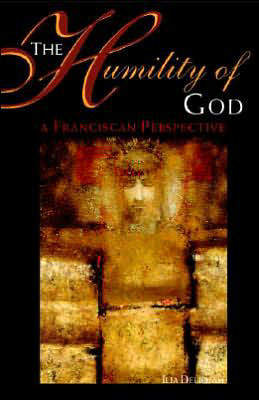
|
Posted February 21, 2009 Updated November 21, 2011 Book: The Humility of God: A Franciscan Perspective Author: Ilia Delio, O.S.F. St. Anthony Messenger Press. Cincinnati, OH. 2005. Pp. 180 An Excerpt from the Jacket:
Although not the first book on God’s humility, it is the first book that explores God’s humility from a Franciscan perspective — a synthesis of God, humility and creation with Christ at the center. This Christ-centered perspective makes it possible to explore the significance of Christ’s humanity as it relates to the understanding of the God-world relationship. What is God’s identity? And how does this identity relate to us? How do we relate to it? Moreover, Delio explains how the Franciscan view provides not only a powerful way of living in relation to God in a world of change, “but also a way of living a meaningful Christian life in a complex and often fragmented world.” An Excerpt from the Book: The problem with God is that sometimes we think we know who God is and other times we are totally baffled by the mere thought of God. I believe that many people relate to God according to the time of the day, month of year, or stage of life. At some stages of life, God is thought of as good, lovable, kind, gentle and merciful, a protector and friend who is close at hand. And yet at other stages, God may be thought of as harsh, unfair, aloof, merciless and really not necessary in a world that has so many problems. We often make God in our own image and this makes God a projection of ourselves. Freud wasn’t wrong after all. But the mystics tell us otherwise. The sixth-century mystic Pseudo-Dionysius (whose identity we still don’t know) said that as soon as we say something about God like “God is my rock” or “God is light,” we must put these thoughts aside for God is much greater than a rock or much more than light. God, Pseudo-Dionysius said, is incomprehensible, beyond our language and imagination, beyond anything we can describe. The only language appropriate to address God is silence. We who think silence means absence of speech are, according to Pseudo-Dionysius, improperly informed. Only in silence can we enter into the great mystery we call “God.” The vast realms of silence where God dwells means that God is much more than a bigger version of Moses or Abraham. God is beyond Being, beyond our imagination, beyond the limits of our speech. If you want to talk to God, Pseudo-Dionysius said, don’t say anything at all. God will listen. Too often our prayers are projections of our own needs and desires and we give God little room to enter into the conversation. Talking all the time to God without ever listening is like a phone conversation with constant static; it is deafening to God. Silence is a language God can speak without being constantly interrupted because God is a mystery of incomprehensible love, and love speaks for itself. If we could really be attentive to the mystery of God in our lives we would realize God is both beyond our thoughts and imaginations (although these can bring us closer to God) and very near to us. As St. Augustine indicated, god is closer to us that we are to ourselves. God is a mystery of silence and intimacy. God is incomprehensible and ineffable, far beyond our wildest imaginations, yet nearer to each of us than we are to ourselves. And another -- The simplest way to describe God’s poverty and humility is in terms of love. Love gives itself away — this is God’s poverty. Love turns toward the other so it can give itself to the other — this is God’s humility. In the Incarnation, God turns toward us through the Son/Word and gives (him)self to us as love. We call this gift of God’s love to us, this total self-emptying love, “kenosis.” The poverty of God is the kenosis or self-emptying of the Word, the descent of the Word, from the riches of divine glory into our fragile human nature. The God whom Francis discovered is a God who shows himself to us in poor and humble fragile human flesh. This is a God who loves us so much as to be reckless in love, a God who throws it all away out of love and never tires of loving. Table of Contents: 1. A hidden God 2. The humble heart of God 3. God humbly bends down 4. A God of faithful love 5. The tears of God 6. The face of God 7. Christic Christians 8. Divinization |
|
